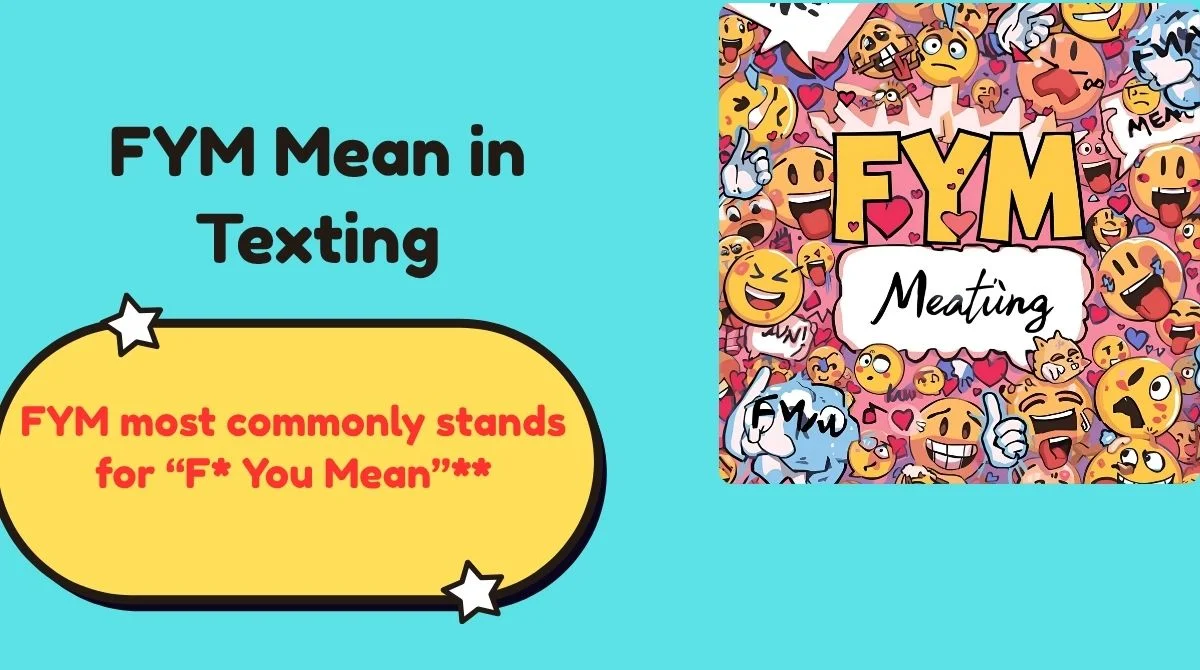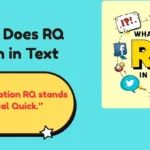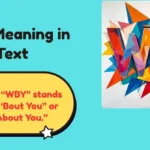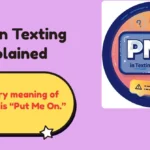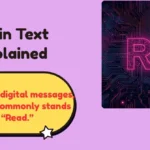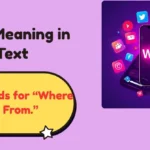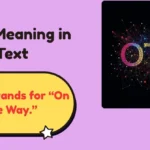Ever been scrolling through texts or TikTok comments and stumbled upon someone typing “FYM”? You pause, tilt your head, and think, “Wait… what does that even mean?” You’re not alone.
Slang evolves faster than we can keep up with, and FYM is one of those abbreviations that can mean a few different things depending on tone, context, and who’s saying it.
In this guide, we’ll break down what FYM means in texting, when it’s okay to use, when it’s definitely not, and what you can say instead.
🔍 What Does FYM Mean in Texting?
The abbreviation FYM most commonly stands for “F* You Mean”** — a slang way of saying “What do you mean?” but with extra attitude.
It’s often used in online conversations, memes, and social media comments when someone’s confused, shocked, or calling out something questionable. The phrase isn’t new — it’s been around in street slang and hip-hop lyrics for years — but it exploded in popularity through Twitter (X), TikTok, and Snapchat where quick reactions rule.
🧠 FYM’s Origin and Usage
- The phrase “What you mean?” or “What do you mean?” evolved in speech into “F*** you mean?” — adding emphasis or disbelief.
- As texting slang grew, people shortened it to FYM for speed and attitude.
- It’s especially common among Gen Z and Millennial users, influencers, and gamers.
Example:
Friend 1: “I just said pineapple belongs on pizza.”
Friend 2: “FYM?! 🍕😂”
Here, the second person isn’t angry — they’re playfully expressing disbelief.
Is FYM Rude, Offensive, or Just Playful?
The truth? It depends on the tone, situation, and who’s reading it. FYM can sound lighthearted among friends, but it can also come off as disrespectful or confrontational.
Let’s break it down:
🟢 Friendly or Playful Contexts
When used among close friends or peers, FYM is more like a reaction emoji than an insult. It shows surprise, disbelief, or mock shock.
Examples:
- “FYM you finished the show without me?! 😭”
- “FYM you met him in person?!”
In casual settings, it’s harmless and often funny.
🔴 Confrontational or Aggressive Contexts
Used with the wrong tone or punctuation, FYM can sound like you’re challenging someone.
Examples:
- “FYM you talking about?”
- “FYM you mean I’m wrong?”
Here, the phrase carries heat. It can feel like a verbal jab, especially if it’s written in all caps or without emojis.
⚠️ Professional or Formal Contexts
This one’s easy: don’t use FYM at work.
In professional emails, team chats, or business messages, it’s inappropriate. It can sound offensive or immature.
If you’re trying to clarify something at work, go for:
- “Could you clarify that?”
- “I might’ve misunderstood—can you explain?”
When You Should Avoid Using FYM
Even though FYM can be funny or expressive, there are times when it’s best avoided. Here’s when:
- Texting someone you don’t know well — it can come off as rude or confusing.
- In group chats with mixed ages — older people may read it literally and take offense.
- During heated debates or disagreements — it can escalate things quickly.
- In formal or professional settings — HR emails and slang don’t mix.
Rule of thumb: if you wouldn’t say it face-to-face in that tone, don’t type it either.
Smarter Alternatives to “FYM” (Polite, Professional, and Casual)
There are plenty of ways to express confusion, surprise, or disbelief without dropping slang that might offend someone.
Here are polished alternatives grouped by tone:
✅ Polite / Professional
- “I’m not sure I understand—could you explain?”
- “Can you clarify that for me?”
- “Sorry, I don’t follow.”
💬 Neutral / Everyday
- “Wait, what?”
- “Really?”
- “Hold on a sec…”
😄 Funny / Playful
- “Say whaaat?!”
- “No way!”
- “You can’t be serious rn 😂”
✨ 15 Better Ways to Say “FYM” (With Real-Life Examples)
Here’s a practical list of alternatives you can use depending on who you’re talking to and the vibe of your chat:
| Phrase | Tone | Example |
|---|---|---|
| “What do you mean?” | Neutral | “What do you mean you’re moving?” |
| “I didn’t quite catch that.” | Polite | “Sorry, I didn’t quite catch that—can you repeat it?” |
| “Can you explain?” | Professional | “Can you explain what you meant by that statement?” |
| “Wait, what?” | Casual | “Wait, what? You’re engaged?!” |
| “Huh?” | Informal | “Huh? I didn’t expect that!” |
| “Hold up…” | Playful | “Hold up… you really did that?” |
| “You serious?” | Neutral | “You serious about quitting your job?” |
| “Really now?” | Playful | “Really now? You’re trying that recipe again?” |
| “Could you repeat that?” | Polite | “Could you repeat that for me?” |
| “That’s hard to believe.” | Curious | “That’s hard to believe—you’re kidding, right?” |
| “Sorry, what did you say?” | Professional | “Sorry, what did you say earlier?” |
| “Come again?” | Neutral | “Come again? I missed that part.” |
| “You can’t be serious.” | Playful | “You can’t be serious—again?” |
| “Did I hear that right?” | Surprised | “Did I hear that right? You got promoted?” |
| “Say that again, please.” | Respectful | “Say that again, please—I want to be sure I heard correctly.” |
Each of these conveys curiosity or disbelief without crossing the line into aggression or profanity.
Why Your Wording Choice Matters (Tone = Message)
Tone can completely flip how your message sounds. A single word, emoji, or punctuation mark can turn curiosity into confrontation.
Let’s compare examples:
| Tone | Text | Interpretation |
|---|---|---|
| Friendly | “FYM you didn’t tell me sooner 😭” | Teasing, surprised |
| Rude | “FYM you mean I’m wrong.” | Defensive, challenging |
| Neutral | “What do you mean?” | Clarifying |
A simple “😂” or “😭” softens tone, while all caps (“FYM??”) amplifies aggression. When in doubt, add emojis or extra context to show your mood.
FYM in Pop Culture, Music, and Social Media
FYM gained traction through hip-hop lyrics and TikTok trends long before it hit texting mainstream. Artists like G Herbo and Lil Durk used “FYM” or “F*** You Mean” in songs to express disbelief or defiance — giving it a street-culture edge.
On TikTok, “FYM” often appears as a reaction comment, usually under wild or unbelievable videos:
“FYM that’s a raccoon in the kitchen?! 🦝💀”
It’s a perfect example of how internet slang blends humor, sarcasm, and culture all at once.
Professional Substitutes for FYM (Work or Business Texting)
In a professional context, clarity matters more than slang. Instead of FYM, use concise, respectful phrases that show curiosity—not confrontation.
| Situation | Instead of FYM | Better Alternative | Tone |
|---|---|---|---|
| Confused about a report | “FYM this data?” | “Could you clarify this data?” | Professional |
| Misheard in meeting | “FYM he said that?” | “Did I hear that correctly?” | Polite |
| Surprised by decision | “FYM we’re cutting budget?” | “Can you explain the budget change?” | Neutral |
These alternatives keep your communication clear, mature, and professional — essential if you want to be taken seriously at work.
Summary Table: FYM Meaning, Usage, Tone & Alternatives
| Context | Meaning | Tone | Example | Safer Alternative |
|---|---|---|---|---|
| Friendly | “F*** you mean” (playful) | Casual | “FYM you didn’t call?” | “Wait, what?” |
| Angry | “F*** you mean” (aggressive) | Confrontational | “FYM you said that?” | “You serious right now?” |
| Professional | Inappropriate | Formal | “FYM this plan?” | “Could you clarify that?” |
This table sums up the essence: same phrase, different tone — completely different effect.
Common Misunderstandings About FYM (FAQs)
What does FYM actually mean?
FYM means “F*** You Mean,” a slang version of “What do you mean?” It’s used to express disbelief or confusion in texting and social media.
Is FYM always rude?
Not necessarily. Among friends, it can sound funny or casual. But in formal or serious settings, it’s best avoided.
Can FYM mean something else?
Rarely, some users might interpret it differently (like “For Your Mother”), but 99% of the time it means “F*** You Mean.”
Is FYM the same as WYM?
Pretty close. “WYM” means “What You Mean” and is a softer, non-offensive version of FYM. You can use WYM safely anywhere.
Should I ever use FYM at work?
No — skip it entirely in work chats, client messages, or emails. It can appear unprofessional or offensive.
🧩 Case Study
A marketing intern once replied to their manager’s message with “FYM?” — meant as “What do you mean?”
The manager, unfamiliar with slang, thought it was profanity and reported it to HR.
Result? Misunderstanding, awkward apology, and a lesson learned: know your audience.
This real-life scenario shows how slang can backfire when tone isn’t understood.
Final Thoughts: Language Evolves—Use It Wisely
Language isn’t static—it changes with culture, memes, and internet humor. FYM is a perfect snapshot of how communication adapts to digital speed.
However, context is everything. What’s funny in a group chat can be offensive in an email.
So next time someone says “FYM,” think before reacting. It might be sarcasm… or a challenge.
👉 Pro Tip: If you’re unsure how someone meant it, just ask. A quick “What do you mean?” keeps the peace and avoids confusion.
“Words have power. How you say something matters just as much as what you say.”
So use slang smartly, understand your audience, and keep your messages clear and kind.
